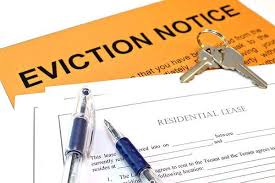Eviction Process in Virginia
Eviction Process in Virginia
Provide Notice to Tenant(s)
The most typical reasons for eviction are: 1) failure to pay rent; and 2) failure to comply with lease obligations, like maintaining the property or adding additional tenants.
If the tenant fails to pay rent, the landlord must give the tenant a 5-Day Notice to Pay or Quit. This notice informs the tenant that they have five days to either pay the rent or move our of the property. See Va. Code § 55-225. If tenant pays the overdue rent, tenant has the right to remain in the property. If the tenant does not pay rent within the five-day time frame, then the landlord can go to court and file an Unlawful Detainer“ to evict the tenant.
If the tenant is not following a non-monetary lease term, the landlord must provide tenant with a “Notice to Quit” (sometimes called a 30 day letter). This notice gives the tenant twenty-one days to correct the issue or vacate the property thirty days from the date tenant was served with notice. See Va. Code § 55-225.43. If tenant corrects the issue in time, the tenant has the right to remain in the property.
Summons for Unlawful Detainer
If the tenant does not pay the past due rent and/ or fails to correct an action that violates the lease, the landlord must file summons for “Unlawful Detainer“. The Unlawful Detainer is filed in General District Court, typically where the property is located. The court issues a summons to the tenant with a “first return date”.
At this return date, the judge typically will ask the tenant if the tenant admits or denies the allegations in the summons. If the tenant denies the allegations, a trial date will be set. The judge may instruct the landlord to provide a Bill of Particulars to explain why the landlord believes they are entitled to possession and judgment. Additionally, based on the Bill of Particulars, the judge may instruct the tenant to provide a Grounds of Defense to explain why the landlord is incorrect.
If the tenant admits the allegations (admits they failed to pay the rent) or if the tenant fails to appear, the landlord may ask for an immediate Writ of Possession and a judgment for unpaid rent. See Va. Code § 8.01-126.
Trial
When a tenant contests the allegations in the summons, a trial is held to determine whether the landlord is legally allowed to evict the tenant. If the court rules that the landlord has a proper basis to evict the tenant, the tenant has ten days to appeal this ruling. To appeal, the tenant must pay an appeal bond (typicality the full amount due) to the court at the time of filing appeal.
Writ of Possession for Unlawful Detainer
If tenant admits to failing to pay rent or the landlord wins at trial, the landlord may file a Request for Writ of Possession for Unlawful Detainer Proceedings to begin the process of actually removing the tenant from the propery. See Va. Code § 8.01-470. When the landlord prevails at trial all that is giving is an order on a piece of paper. In order to actually force the tenant to vacate the landlord must file a writ of possession. This writ must be filed within one year of the judgment, typically landlords file as soon as possible so they can remove the tenant . See Va. Code § 8.01-471. The court sends the Writ of Possession to the Sheriff’s Office and the Sheriff’s Office should execute the writ in fifteen days, but has thirty days from when the court signed the writ to execute the eviction. Generally, the Sheriff’s Office will contact the landlord and scheduled a date for the eviction. The tenant must be given at least 72 hours notice, prior to the eviction.

